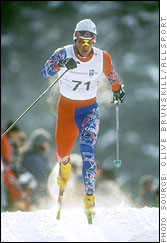Originally, the sport of cross-country skiing was simply one half of the Nordic combined event made popular by the Norwegian ski festivals of the late 1800s. Separate cross-country-only competitions gained popularity quickly, and two men’s events were included at the first Winter Olympic Games in 1924. Cross-country skiing is one of seven winter sports that have been contested at every Winter Games. The first women’s cross-country event, however, was not added until the 1952 Games in Oslo, Norway.
Men’s events: 1.5-km sprint; 15-km classical; 50-km freestyle; team sprint; combined pursuit; and 4 x 10-km relay.Women’s events: 1.5-km sprint; 10-km classical; 30-km freestyle; team sprint; combined pursuit; 4 x 5-km relay.
There are two styles of cross-country skiing at the Olympics.
Classical: similar to ski-exercise machines, skiers use a straight stride and must stay within predetermined parallel tracks; this was the only style allowed at the Olympics until 1988.Freestyle: reminiscent of speed skaters; skiers push off with each ski on each stride; this type of skiing is much faster than classical.
The sprint competition is a single-elimination tournament that begins with 16 skiers grouped into four heats. The top two finishers in each heat advance. The process is repeated until there are four semifinalists competing for the three medals. The combined pursuit is a classical race followed by a freestyle race. The skiers’ classical time determines the staggered start for the freestyle race. Thus, the gold medal goes to the first skier to cross the freestyle-race finish line. The relay is similar to those run in track and field. Except instead of passing a baton, skiers must simply touch their teammate with their hand to initiate the next leg. The United States’ lone cross-country medal is a silver won by Bill Koch in 1976. Norway, Russia, and Italy have dominated this sport over the last several Winter Games.
More about the 2006 Winter Olympics
